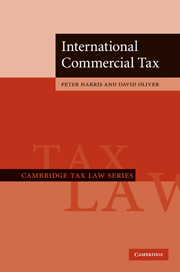Book contents
- Frontmatter
- Contents
- Preface
- List of abbreviations
- Table of Cases
- Table of statutes
- Table of treaties
- Introduction
- 1 Fundamentals and sources of international tax law
- 2 The jurisdiction to tax
- 3 Source country taxation
- 4 Residence country taxation
- 5 The limited scope of treaties
- 6 Changes of source and residence
- 7 Bilateral administrative issues
- Conclusion
- References
- Index
3 - Source country taxation
Published online by Cambridge University Press: 03 May 2011
- Frontmatter
- Contents
- Preface
- List of abbreviations
- Table of Cases
- Table of statutes
- Table of treaties
- Introduction
- 1 Fundamentals and sources of international tax law
- 2 The jurisdiction to tax
- 3 Source country taxation
- 4 Residence country taxation
- 5 The limited scope of treaties
- 6 Changes of source and residence
- 7 Bilateral administrative issues
- Conclusion
- References
- Index
Summary
Chapter 2 has laid the foundations and principles upon which the rest of this book is built. As mentioned in the introduction, the discussion now proceeds to consider the tax treatment in the country in which the income arises, the country in which the source of the income is located. In the context of the Base Case, Figure 1 on page 5, this is Country A, the country where the office building is located with respect to which the rent is paid. There are two persons involved in the Base Case, the payer, Allan, and the recipient, Beth, and the treatment of each by Country A must be considered. It is not always the case that there are tax consequences for the payer in the country where the income is sourced but in international commercial transactions, this is most common and is, therefore, the basis upon which the following discussion proceeds.
Dealing with the income recipient first, i.e. Beth, the tax treatment by the source country, i.e. Country A, typically depends on the type of income derived and whether or not a tax treaty applies. As discussed at 2.1.2.1, both UK domestic law and tax treaties incorporate a schedular approach to taxation based on source. The discussion under the first heading of this chapter considers taxation of the income recipient by the source country. It proceeds in accordance with the schedular approach adopted by the OECD Model, rather than that adopted under UK domestic law.
- Type
- Chapter
- Information
- International Commercial Tax , pp. 118 - 263Publisher: Cambridge University PressPrint publication year: 2010

